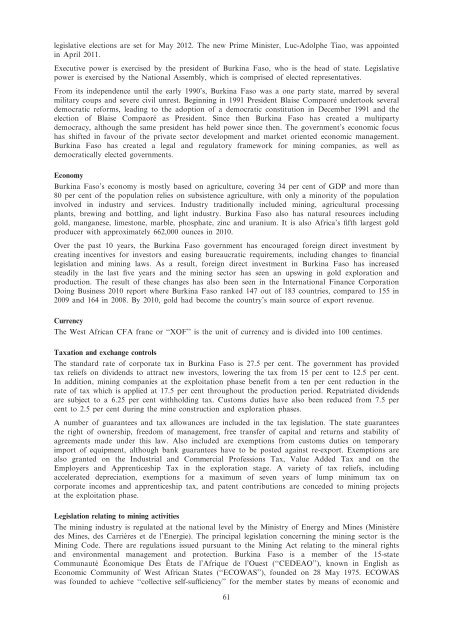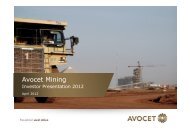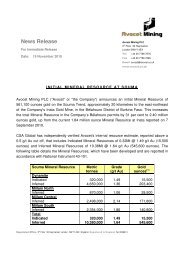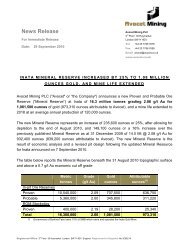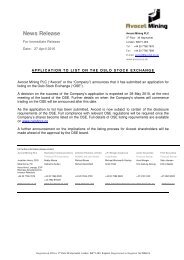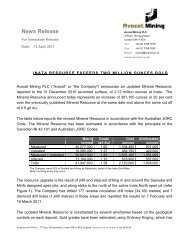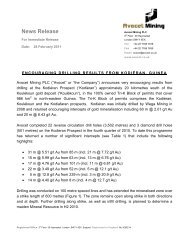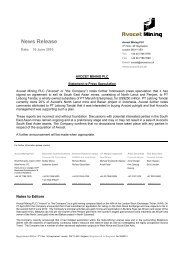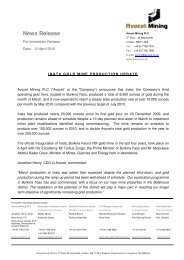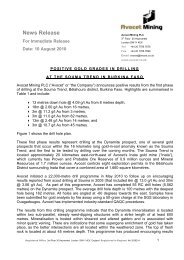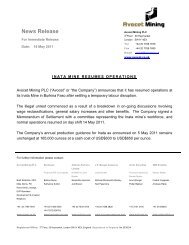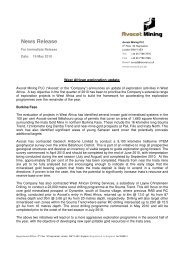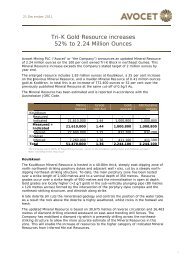Avocet Mining PLC Prospectus December 2011
Avocet Mining PLC Prospectus December 2011
Avocet Mining PLC Prospectus December 2011
You also want an ePaper? Increase the reach of your titles
YUMPU automatically turns print PDFs into web optimized ePapers that Google loves.
c105718pu030 Proof 5: 7.12.11_13:38 B/L Revision:<br />
legislative elections are set for May 2012. The new Prime Minister, Luc-Adolphe Tiao, was appointed<br />
in April <strong>2011</strong>.<br />
Executive power is exercised by the president of Burkina Faso, who is the head of state. Legislative<br />
power is exercised by the National Assembly, which is comprised of elected representatives.<br />
From its independence until the early 1990’s, Burkina Faso was a one party state, marred by several<br />
military coups and severe civil unrest. Beginning in 1991 President Blaise Compaoré undertook several<br />
democratic reforms, leading to the adoption of a democratic constitution in <strong>December</strong> 1991 and the<br />
election of Blaise Compaoré as President. Since then Burkina Faso has created a multiparty<br />
democracy, although the same president has held power since then. The government’s economic focus<br />
has shifted in favour of the private sector development and market oriented economic management.<br />
Burkina Faso has created a legal and regulatory framework for mining companies, as well as<br />
democratically elected governments.<br />
Economy<br />
Burkina Faso’s economy is mostly based on agriculture, covering 34 per cent of GDP and more than<br />
80 per cent of the population relies on subsistence agriculture, with only a minority of the population<br />
involved in industry and services. Industry traditionally included mining, agricultural processing<br />
plants, brewing and bottling, and light industry. Burkina Faso also has natural resources including<br />
gold, manganese, limestone, marble, phosphate, zinc and uranium. It is also Africa’s fifth largest gold<br />
producer with approximately 662,000 ounces in 2010.<br />
Over the past 10 years, the Burkina Faso government has encouraged foreign direct investment by<br />
creating incentives for investors and easing bureaucratic requirements, including changes to financial<br />
legislation and mining laws. As a result, foreign direct investment in Burkina Faso has increased<br />
steadily in the last five years and the mining sector has seen an upswing in gold exploration and<br />
production. The result of these changes has also been seen in the International Finance Corporation<br />
Doing Business 2010 report where Burkina Faso ranked 147 out of 183 countries, compared to 155 in<br />
2009 and 164 in 2008. By 2010, gold had become the country’s main source of export revenue.<br />
Currency<br />
The West African CFA franc or ‘‘XOF’’ is the unit of currency and is divided into 100 centimes.<br />
Taxation and exchange controls<br />
The standard rate of corporate tax in Burkina Faso is 27.5 per cent. The government has provided<br />
tax reliefs on dividends to attract new investors, lowering the tax from 15 per cent to 12.5 per cent.<br />
In addition, mining companies at the exploitation phase benefit from a ten per cent reduction in the<br />
rate of tax which is applied at 17.5 per cent throughout the production period. Repatriated dividends<br />
are subject to a 6.25 per cent withholding tax. Customs duties have also been reduced from 7.5 per<br />
cent to 2.5 per cent during the mine construction and exploration phases.<br />
A number of guarantees and tax allowances are included in the tax legislation. The state guarantees<br />
the right of ownership, freedom of management, free transfer of capital and returns and stability of<br />
agreements made under this law. Also included are exemptions from customs duties on temporary<br />
import of equipment, although bank guarantees have to be posted against re-export. Exemptions are<br />
also granted on the Industrial and Commercial Professions Tax, Value Added Tax and on the<br />
Employers and Apprenticeship Tax in the exploration stage. A variety of tax reliefs, including<br />
accelerated depreciation, exemptions for a maximum of seven years of lump minimum tax on<br />
corporate incomes and apprenticeship tax, and patent contributions are conceded to mining projects<br />
at the exploitation phase.<br />
Legislation relating to mining activities<br />
The mining industry is regulated at the national level by the Ministry of Energy and Mines (Ministère<br />
des Mines, des Carrières et de l’Energie). The principal legislation concerning the mining sector is the<br />
<strong>Mining</strong> Code. There are regulations issued pursuant to the <strong>Mining</strong> Act relating to the mineral rights<br />
and environmental management and protection. Burkina Faso is a member of the 15-state<br />
Communauté Économique Des États de l’Afrique de l’Ouest (‘‘CEDEAO’’), known in English as<br />
Economic Community of West African States (‘‘ECOWAS’’), founded on 28 May 1975. ECOWAS<br />
was founded to achieve ‘‘collective self-sufficiency’’ for the member states by means of economic and<br />
61


